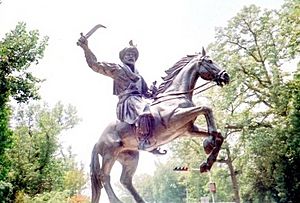Bakht Khan facts for kids
Quick facts for kids
General Bakht Khan
|
|
|---|---|

General Bakht Khan
|
|
| Born | 1797 Bijnor, Rohilkhand, Mughal empire
|
| Died | 13 May 1859 (aged 61–62) |
| Occupation | Subedar in the British East India Company, Commander-in-chief of Indian Rebels under Mughal Emperor |
| Known for | Indian Rebellion |
Bakht Khan (born 1797, died 1859) was a very important leader during the Indian Rebellion of 1857. He was the main commander of the Indian rebel forces in Delhi. These forces were fighting against the East India Company, which was a British trading company that ruled much of India at the time.
Contents
Bakht Khan's Early Life
Bakht Khan was born in Bijnor, a place in India. His father was from the Rohilla people. His mother was a princess from Awadh.
He joined the army of the British East India Company. He became a subedar, which was a high-ranking Indian officer. Bakht Khan had about 40 years of experience in the army. He was part of the Bengal horse artillery. He also fought in the First Anglo-Afghan War.
Before the rebellion, many British officers knew Bakht Khan. They thought he was a very smart person. One colonel even said he liked spending time with British people.
The Indian Rebellion of 1857
The Indian Rebellion of 1857 began because of new rifle cartridges. Soldiers believed these cartridges were greased with animal fat. This upset both Muslim soldiers, who do not eat pork, and Hindu soldiers, who do not eat beef. The rebellion quickly spread across areas near Delhi.
When the rebellion started in Bareilly, Bakht Khan was made a general by the Indian soldiers. When he heard about the uprising in Meerut, he decided to go to Delhi. He wanted to help the army of the Mughal emperor, Bahadur Shah Zafar.
Bakht Khan Arrives in Delhi
Bakht Khan arrived in Delhi on July 1, 1857. He brought many Rohilla soldiers with him. By then, rebel forces had already taken control of the city. The Mughal ruler, Bahadur Shah Zafar, had been declared the Emperor of India.
Bakht Khan's group from Bareilly was very strong. It included four groups of Indian soldiers, one cavalry group, and artillery. The British forces who were trying to take Delhi back were worried by this large, well-organized group. Emperor Bahadur Shah Zafar was very impressed. Bakht Khan and his officers were quickly called to meet the emperor.
The emperor's oldest son, Mirza Mughal, was the chief general. But he did not have much military experience. When Bakht Khan arrived, the leadership of the rebel forces got much better.
Bakht Khan's Leadership
Bakht Khan was very good at managing things. The emperor soon gave him real power. He gave Bakht Khan the special title Saheb-e-Alam Bahadur, which means Lord Governor General. Bakht Khan became the true commander of the rebel soldiers. Even though Mirza Zahiruddin was still called the commander-in-chief, Bakht Khan was in charge.
Bakht Khan faced many challenges. The first big problem was money. He got permission from the emperor to collect taxes to help. Another problem was getting enough supplies for the soldiers. This became harder as time went on. It got even worse when British forces attacked Delhi in September 1857.
The British had many spies in the city. They kept trying to make Bahadur Shah surrender. The situation in Delhi quickly got worse. Bakht Khan was a strong leader, but he could not fix all the problems. The rebels lacked organization, supplies, and enough military power.
Delhi was under siege from June 8, 1857. On September 14, the British attacked the Kashmiri Gate. Bahadur Shah fled to Humayun's Tomb. He surrendered to the British on September 20, 1857, even though Bakht Khan begged him not to. The emperor was arrested.
Bakht Khan left Delhi and joined other rebel forces. He went to Lucknow and Shahjahanpur. Later, Bahadur Shah Zafar was put on trial. He was sent away to Rangoon in Burma, where he died in 1862.
Bakht Khan's Death
Bakht Khan died on May 13, 1859, from his injuries. He was buried in a graveyard in Nanser. This place was part of Swat back then. Today, it is in Buner, in the Khyber Pakhtunkhwa Province of Pakistan. Some historians say he went to Swat after the war was lost. He lived there under the protection of the Akhund of Swat until he died.

